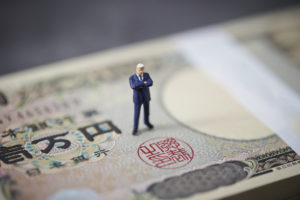What is a Japanese company?
 I had anticipated the “do you have any questions for us?” at a recent final interview for a non-executive directorship for an investment trust focused on Japan. I was advised by another experienced non-executive director to think of a thought provoking question, to show the board I was capable of bringing a different perspective, something they had not thought of before.
I had anticipated the “do you have any questions for us?” at a recent final interview for a non-executive directorship for an investment trust focused on Japan. I was advised by another experienced non-executive director to think of a thought provoking question, to show the board I was capable of bringing a different perspective, something they had not thought of before.
On reflection, I probably erred too far on the “thought provoking”. It was a genuine question, however, and I was genuinely interested in their answer. As the fund’s strategy was to invest only in Japanese companies, how do you define a Japanese company?
Listed in Japan or majority of business in Japan?
The fund defined it as being listed on a Japanese stock exchange. This may seem a clear enough definition, but does this mean Sharp, now owned by a Taiwanese company, Hon Hai, is a still a Japanese company? How about Hitachi Power Tools and Calsonic Kansei, now both owned by American buyout firm KKR?
Other Japan focused funds also invest in companies that are listed outside Japan, so long as a significant majority of their business is in Japan. But if percentage of sales in Japan is the criterion, then there are plenty of Japanese companies who are listed in Japan, for whom a majority of their business is outside Japan – Takeuchi for example exports 95% of its diggers to overseas markets and 68% of Sony’s business is outside Japan.
Avoiding ‘country risk’
Why does it matter? It matters to the boards of such funds, because if they define “Japanese” as Japan listed or majority of business in Japan, then clearly they need to consider the “country risk” of Japan and ensure the strategy is adjusted, or mitigation is put in place accordingly.
They need an expert in Japanese economics or politics to read the entrails on whether Prime Minister Abe will be re-elected as leader of the LDP in September, and if so whether he will be in a strong enough position to carry on with his “Three Arrows” of reform. They need to be able to judge whether the recent dip in Japan’s GDP growth is temporary, or likely to be revised upwards in June, as often happens. They might need some inside track on trade friction around the world and how this might affect the Yen.
But if the strategy is to invest in specific Japanese companies with long term growth potential, then this is not the same as investing in the Japanese economy or a Japanese index tracker. The aim should be to look for companies that will succeed no matter what happens to the Yen or Abe.
Managed by Japanese executives?
Specifying that those companies should be Japanese indicates to me that there is thought to be something unique to Japanese companies that makes them worthy of special attention. So should it be that the management of the company is Japanese? In which case, how should Takeda be classified – likely to become even more dominated by non-Japanese executives after the acquisition of Shire?
What about other companies who, like Takeda, have substantial overseas business acquired through acquisition, but manage it mostly through an international HQ based outside Japan, such as Japan Tobacco (Swiss HQ) or Dentsu (Dentsu Aegis Network in the UK)?
Or how about SoftBank, founded and run by Masayoshi Son, ethnically Korean and educated in the USA? The original telecoms business is clearly Japanese, but what about ARM in the UK and Sprint in the US – not to mention Softbank’s massive Vision Fund which notably is not investing much into Japanese companies at all?
Where Japanese companies have the edge…
I propose some further, admittedly fuzzier definitions of “Japanese”. Firstly, the business should reflect an aspect where Japan has an “edge” – a comparative advantage. For example, any business that is focused on the elderly, as Japan has the most rapidly ageing population in the world, with over 25% over the age of 65. Or a business which has evolved from Japan’s traditional manufacturing and craftsmanship strengths, what is known as monozukuri in Japanese – highly sophisticated machine tools, robotics and components.
But I think there is something more than that to being “Japanese”. It’s about the corporate culture and governance – a different model to the Anglo-Saxon shareholder value maximization model. Investing in a Japanese company should be for long term capital growth rather than a quick dividend, as well as some satisfaction that the investment is going into a company which does not engage in creative destruction type capitalism.
…is also where the risks lie
And this is where the risks also lie. Japan’s stakeholder capitalist model means job security, but also hidden underemployment and low productivity. Jealous guarding of corporate reputation can mean cover ups when something goes wrong. Strong loyalty to other members of the corporate family can mean deference to seniors without questioning or challenging orders given. Extreme risk aversion can mean opportunities missed.
Understanding and mitigating these risks is not something that can be resolved by an informal chat with a contact in a ministry, nor by looking at exchange rate forecasts and putting some hedges in place.
This was the conversation I wanted to have, and where I thought I could add value, but that’s the trouble with the “any questions for us” coming at the end of the interview. As the board chair said – fascinating question, but you’d need a whole afternoon or a seminar to thrash it out. And no, I did not get the job.
For more content like this, subscribe to the free Rudlin Consulting Newsletter. 最新の在欧日系企業の状況については無料の月刊Rudlin Consulting ニューズレターにご登録ください。
Read More
 I partly set up this blog to address the lack of good quality information on Japanese companies in English, as well as to analyse how European and Japanese business cultures interact.
I partly set up this blog to address the lack of good quality information on Japanese companies in English, as well as to analyse how European and Japanese business cultures interact.